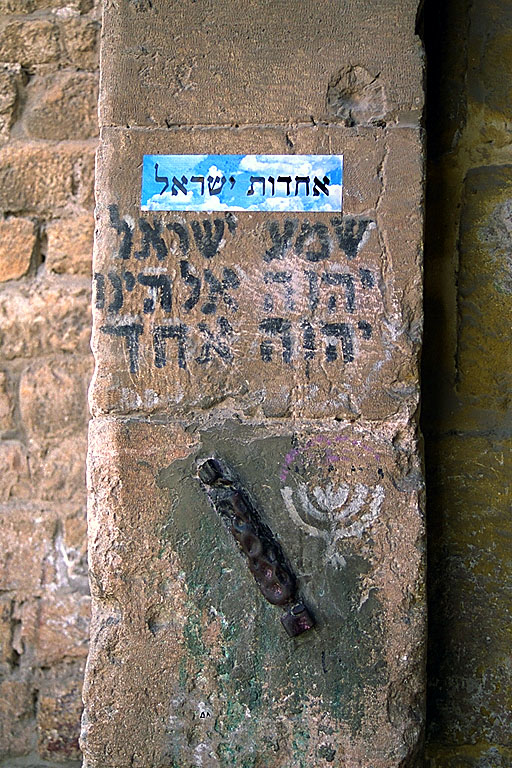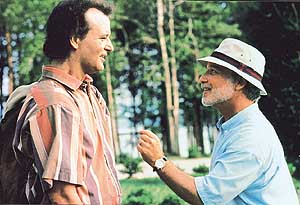The Bible lesson for tomorrow is Deuteronomy 6:4-9:
4Hear, O Israel: The Lord is our God, the Lord alone. 5You shall love the Lord your God with all your heart, and with all your soul, and with all your might. 6Keep these words that I am commanding you today in your heart. 7Recite them to your children and talk about them when you are at home and when you are away, when you lie down and when you rise. 8Bind them as a sign on your hand, fix them as an emblem on your forehead, 9and write them on the doorposts of your house and on your gates.A Few Comments:
1. Deuteronomy--the name is Greek for Second Law, is a kind of farewell address from Moses to the Hebrew people, God's chosen people.
After forty years of wandering in the wilderness, the people--actually the descendants of the adults who had been freed from slavery in Egypt by God--are about to enter the "promised land." Because of his apparent rebellion against God, Moses knows that he won't be making that journey with them. (The only members of that original generation allowed to enter that land, in fact, would be Joshua and Caleb. They alone remained faithful to God throughout the trials of faith that came during the wilderness wanderings.)
2. The main purpose of Moses' discourse is to remind the people of God's past faithfulness and to call them to respond to God's gracious deliverance of His people with faithfulness to God. Repeatedly, Moses reminds the people of how God freed them from slavery and how He protected them and even forgave them in the wilderness.
3. The Passover and Exodus, when God freed His people from death and slavery, are, taken together, the central event of the Old Testament. They are the defining moments of Old Testament faith.
A similar event, one which we Christians see as the fulfillment of Old Testament law, prophecy, and history, plays a similarly defining role in New Testament faith. That event is the death and resurrection of Jesus.
Unlike Moses, Jesus, Whose Name in Hebrew is Yeshua--Joshua did not rebel against the Father in His wilderness experience. (The name Joshua means God Saves.) Like His Old Testament antecedent, Joshua, who succeeded Moses as leader of the Hebrew people, Jesus of Nazareth remained firmly fixed on doing the Father's will. This remained true of Jesus even when He was driven into the wilderness by the Holy Spirit in order to be tempted by the devil. (Of course, unlike the Old Testament Joshua, the New Testament teaches that Jesus was completely sinless.)
The result of the Passover and the Exodus in the Old Testament is that the people were freed from slavery in Egypt and they could develop their nation which, Martin Luther said, became the crib for the Savior of the world.
The result of Jesus' exodus is that all who turn from sin (repent) and follow Him are freed forever from sin, death, and futility.
4. These verses of Deuteronomy are referred to by Jews as the Shema. The name is for the Hebrew word that comes at the beginning of the passage: Hear.
5. In the Shema, Moses tells the people to love God completely. Then, he urges the people to use all manner of methods to remember the faithfulness of God and their allegiance to Him. The bitter experiences of the wilderness, when the people often forgot God and chased after idols, would have given Moses plenty of motivation for underscoring the importance remembering God!
6. In verse 8, Moses says, "Bind them as a sign on your hand, fix them as an emblem on your forehead..." Many Jews have taken these words literally, wearing what are called phylacteries on their foreheads or their arms.
Dictionary.com has a great explanation of what a phylactery is:
[E]ither of two small, black, leather cubes containing a piece of parchment inscribed with verses 4–9 of Deut. 6, 13–21 of Deut. 11, and 1–16 of Ex. 13: one is attached with straps to the left arm and the other to the forehead during weekday morning prayers by Orthodox and Conservative Jewish men.Phylacteries worn on the forehead are usually divided into four compartments, each containing parchments of a different Biblical passage. Those worn on the arm have one compartment containing a single parchment with the three passages mentioned above.
Here's an illustration showing a boy wearing a forehead phylactery:

Here's a photograph showing singer/composer Bob Dylan wearing a forehead phylactery:

This man is wearing a forearm phylactery:

This is a closer view of how a phylactery is worn, taken from an online encyclopedia of the Jewish faith:

The Archaeological Study Bible says:
It is unclear whether or not the Exodus and Deuteronomy texts were meant to be taken literally, since the commands about binding found in Proverbs 6:20-21 and 7:1-3 are not considered to be literal.Whether to be taken literally or figuratively, I think that the intent of Moses' command is clear. While Moses doesn't want the people to hide their faith (any more than Jesus minds it), the phylacteries aren't meant to be ostentatious shows of piety for the world. Rather, he's commending the phylacteries--literal or figurative--as means by which the Jewish people themselves would remember their God and His faithfulness.
7. In verse 9, Moses says: "...and write them [God's commands] on the doorposts of your house and on your gates."
Most people walk through the doors of their homes each day, making the doorframe an ideal place for a regular reminder of God's faithfulness. Mezuzot, small containers made of wood or metal and containing passages of Scripture, are often used by faithful Jews today in response to Moses' words in the Shema.
Today, many Christians choose to put a cross by their front doors, as much to remind themselves of what Christ has done for them on the cross as a witness for the world.
Below are images of a mezuzot (or mezuzah) in Israel; a collection of mezuzot from a catalog; and an interesting one that can be found on Main Street at Disneyland in California.






